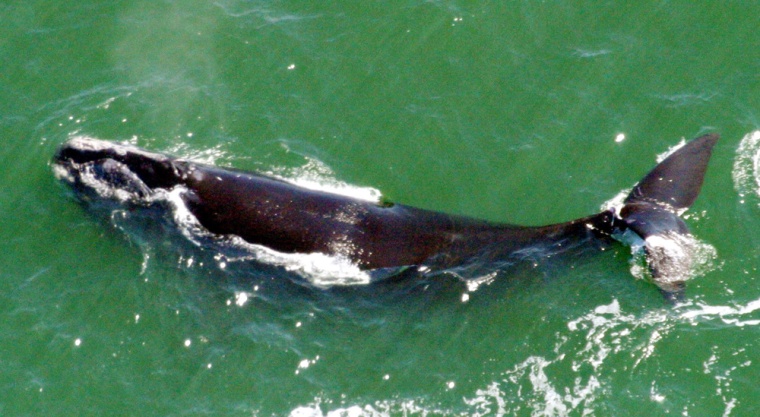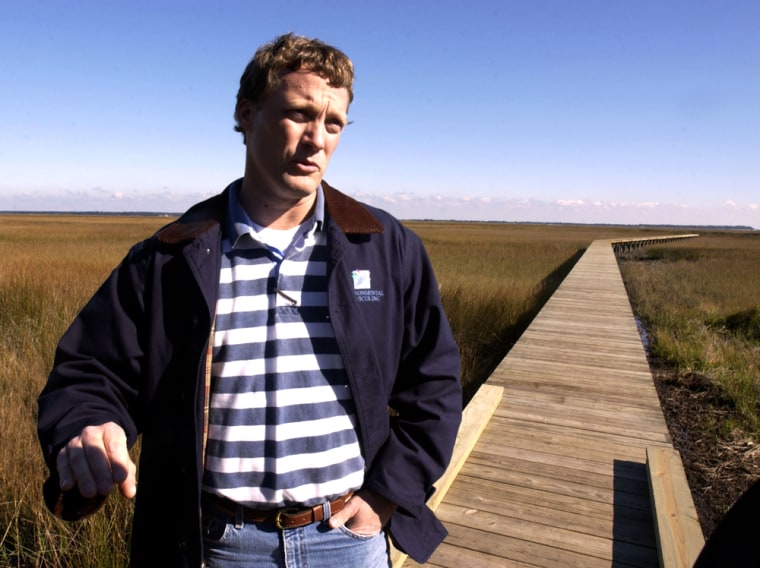The rare northern right whale thrashed the water with its wounded tail, bleeding into the ocean from a long gash inflicted by a 43-foot yacht.
Ten months later, the whale is presumed dead. And with only about 300 of its kind believed to still exist, researchers consider losing even one to be a giant step toward extinction.
A lawsuit filed by conservationists concerned about whale deaths seeks to stop a developer from building two new marinas in the area that would hold up to 800 boats, making it the state’s largest marina facility.
Georgia officials approved the project’s construction just days before northern right whale No. 2425 was injured in March. The developer’s permit also would allow up to 92 private docks from homes that are being built as part of a gated subdivision.
Gordon Rogers, the Satilla riverkeeper and one of the plaintiffs in the court challenge, said the legal fight aims to set precedent for how Georgia safeguards rare species and salt marshes as new developments rise along the state’s 100-mile coastline.
“Is Cumberland Harbour going to be the last nail in their coffin? Of course not,” Rogers said. “But it has been held out as a model for future development.”
Developer’s perspective
However, Mike DeMell, an environmental consultant for the Cumberland Harbour development, said the odds of a boat hitting a right whale in the ocean are so minuscule that “we can’t measure it.”

Boaters will receive information packets on avoiding right whales and other endangered species, DeMell said. Though they can’t be forced to read them, boaters must sign a contract saying they have.
Reduced-speed zones will be enforced close to shore to help avoid collisions with manatees and federal laws requiring boaters to stay 500 yards from visible right whales also will be enforced, DeMell said. Boaters violating these rules three times will be barred from the marinas.
“It’s not like you’ve got 800 boats, all power boats, and every weekend they’re going to hit the water,” DeMell said. “Eight-hundred boats going offshore to run over right whales is an incorrect way to look at what the effect is going to be.”
Researcher sees ‘urbanization’ problem
Amy Knowlton, a right whale researcher at the New England Aquarium in Boston, said that the added traffic poses risks.
“It’s a very difficult problem that right whales face, the urbanization of their habitat,” Knowlton said.
Between December and March each year, pregnant right whales migrate to the shallow waters off Georgia and northern Florida. They are the only known U.S. waters where these whales give birth.
Scientists say collisions with boats and ships, mostly commercial and fishing vessels, kill the most right whales — accounting for 19 of 50 known deaths since 1996.
In July, researchers sounded an alarm in the journal Science, writing that eight U.S. right whale deaths had been confirmed in the preceding 16 months — a mortality rate that was “unprecedented in 25 years of study.”
An administrative law judge is expected to rule in the coming months on whether the developer’s permit can stand or if it must be reconsidered by the state.
Other wildlife
The marshes and waters surrounding the Point Peter peninsula, where construction began on Cumberland Harbour in 2003, have long been critical habitat to a number of struggling species.
Endangered wood storks roost along Point Peter Creek, on the peninsula’s eastern edge. West Indian manatees swim close to shore in the warmer months. Threatened loggerhead sea turtles feed in the inshore waters and nest on neighboring Cumberland Island, which is federally protected.
Meanwhile, Cumberland Harbour has sold 800 of its 1,044 lots, said sales manager Todd Montgomery.
“Folks moving to this area want to be able to access and enjoy the waterways,” Montgomery said from a boat navigating the creek past signs marking future home sites on shore. “The climate’s wonderful, the scenery’s wonderful, but that water access is a big factor.”
